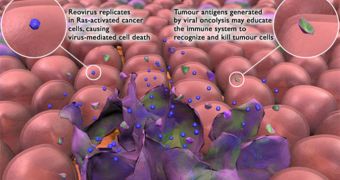Scientists at Oncolytics Biotech Inc., a Calgary, Canada-based company, announce that they are in the final stages of developing a new type of viral therapy against many forms of cancerous cells. They add that the method relies on using a certain type of usually harmless virus against tumors, which is able to morph into a very powerful killing machine, capable of selecting against healthy cells. In the technique developed at OB, the common viral agent turns deadly within three days, and the experts are in the final stages of testing the therapy, before the research is concluded.
According to documents we received from the company, the new form of therapy, Reolysin, addresses a broad range of cancers, from that affecting the head and neck to the ones destroying lungs and livers. It would appear that the new form of treatment produces only minor side-effects in patients, while also remaining highly effective in killing the infected cells. This means that, if the product turns out to be working properly in the end, we could witness a complete reshaping of the way several types of cancers are now being handled.
The reovirus (Respiratory Enteric Orphan virus) is the main target of investigation here. Specialists at OB say that the agent causes little to no health problems in humans, and that most people's immune systems learn how to deal with it by the age of 12. However, cancer cells have yet to develop a way of handling it, so, if the microorganism is injected into tumors, the cells within die within three days of contact. This approach has proven successful on so many cancers, that the scientific and medical communities are buzzing with excitement.
“Reolysin works well in combination with the typical first line and second line chemotherapeutic products,” the CEO of Oncolytics Biotech, Dr. Brad Thompson, explains. He reveals that clinical trials using both the viral agent and chemotherapy or radiation have proven to be extremely effective at promoting cancer-cell death. But the difference between these therapies occurs in the side-effects they produce. While chemo and radiation produce significant shifts in a patient's quality of life, Reolysin only triggers minor, flu-like symptoms. Thomson says that the low-grade fever and the tiredness associated with this therapy pass within 24 to 48 hours.
“Oncolytics is the first company to reach an agreement with the FDA on a Phase 3 trial design for an intravenously-administered oncolytic virus under the SPA process. This is an exciting step forward for our clinical program for REOLYSIN, which has become a first-in-class agent,” Dr. Thompson concludes.

 14 DAY TRIAL //
14 DAY TRIAL //